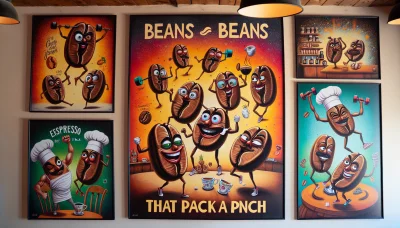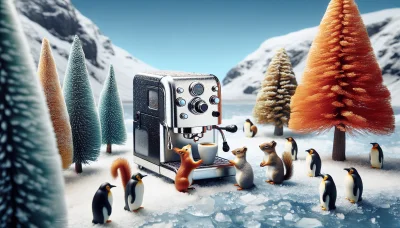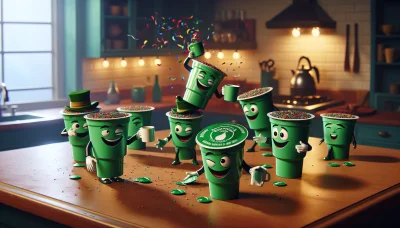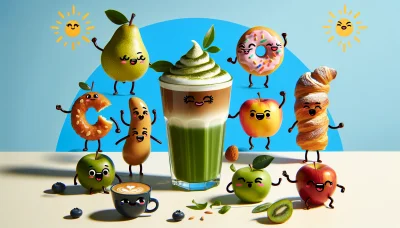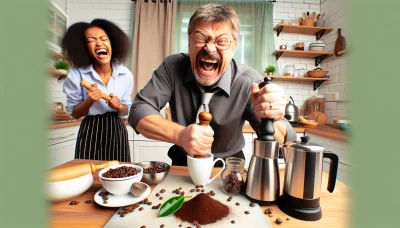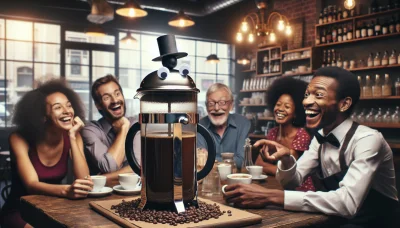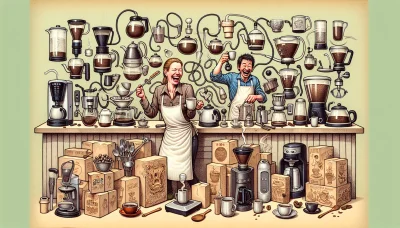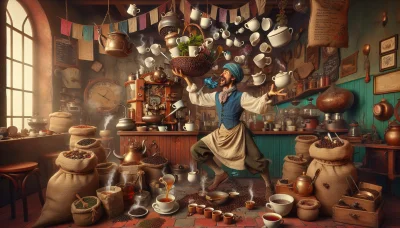Begin Your Brewing Journey with The Coffee Bean & Tea Leaf Quiz
Test Your Knowledge
Question of
Begin Your Brewing Journey with The Coffee Bean & Tea Leaf
Embarking on the path to brewing your own coffee or tea at home is not just about indulging in your favorite beverages; it's about embracing a ritual that brings joy, comfort, and a sense of accomplishment. With The Coffee Bean & Tea Leaf as your guide, you'll discover the art and science behind the perfect cup. Whether you're a coffee aficionado or a tea enthusiast, understanding the nuances of brewing can transform your daily routine into a cherished moment of tranquility. From selecting the right beans and leaves to mastering various brewing techniques, we'll equip you with the knowledge and tools needed to elevate your home brewing experience. Join us as we explore the world of coffee and tea, one cup at a time.
Understanding the Basics of Brewing
The basic principles of brewing coffee and tea revolve around extracting the flavors and aromas from the coffee beans or tea leaves by steeping them in hot water. The key factors influencing the quality of the brew include the water temperature, the grind size of coffee beans, the steeping time, and the ratio of water to coffee or tea. For coffee, a temperature of about 195°F to 205°F is ideal for extracting the full flavor without bitterness. A medium grind works well for most brewing methods, such as drip or French press. For tea, the water temperature and steeping time vary depending on the type of tea; for example, green teas require cooler water (around 175°F) and shorter steeping times than black teas, which thrive in boiling water for a few minutes. The proper balance of these elements ensures a perfect cup of coffee or tea, highlighting the unique characteristics of each blend or varietal. Additionally, using fresh, high-quality water and freshly ground coffee beans or loose-leaf tea can significantly enhance the flavor of your brew.
Choosing Your Beans and Leaves
When it comes to brewing the perfect cup of coffee or tea, selecting the right beans or leaves is crucial. For coffee aficionados, consider the origin of the beans, as different regions offer distinct flavor profiles. Look for beans that are freshly roasted to ensure maximum freshness and flavor. For tea lovers, the quality of the leaves matters immensely. Opt for whole leaves over broken ones, as they retain their essential oils and aroma better, providing a more flavorful brew. Additionally, consider the level of oxidation or fermentation the leaves have undergone to understand the flavor and strength of the tea. Whether you're a coffee connoisseur or a tea enthusiast, experimenting with different beans and leaves can lead to discovering your perfect brew.
Equipment Needed for Brewing
- Kettle - For boiling water to the right temperature.
- Grinder - If using whole bean coffee, a grinder is essential for fresh grounds.
- Scale - To measure the exact amount of coffee or tea for consistent brewing.
- Filter or Infuser - Depending on your brewing method, you'll need a paper filter, metal filter, or a tea infuser.
- Coffee Maker or Tea Pot - Choose according to your preference, whether it's a drip coffee maker, French press, or a classic tea pot.
- Thermometer - To ensure water is the ideal temperature for brewing coffee or tea.
- Timer - To time the brewing process for perfect extraction.
- Mug or Cup - The final, but most important, piece of equipment for enjoying your freshly brewed beverage.
The Brewing Process
The art of brewing the perfect cup of tea or coffee is a process that has been refined over centuries, captivating the senses and energizing the mind. Whether you're a tea enthusiast or a coffee aficionado, understanding the step-by-step process is key to achieving that perfect brew. For coffee, it begins with selecting the finest beans, which are then roasted to perfection to unlock their full flavor potential. The beans are ground to the right consistency, and hot water is then passed through the coffee grounds, extracting the rich flavors and aromas. On the other hand, brewing tea involves selecting high-quality leaves, heating water to the right temperature, and steeping the leaves for the perfect amount of time to extract their essence without bitterness. Both processes require precision and care, resulting in a delightful cup that's worth the effort. Alongside the brewing, various products like filters, grinders, kettles, and specialized cups enhance the experience, making each sip a testament to the art of brewing.
Common Mistakes to Avoid When Brewing
- Using the Wrong Water Temperature: For coffee, water should be just off the boil (about 195°F to 205°F). For green or white teas, cooler water (around 170°F to 185°F) is ideal to avoid bitterness.
- Incorrect Coffee-to-Water Ratio: A general guideline is about 1 to 2 tablespoons of coffee for every 6 ounces of water. Adjust to taste, but avoid too much or too little coffee.
- Not Cleaning Equipment Regularly: Residual oils and grinds can impart unwanted flavors. Clean your coffee maker or tea pot regularly to maintain the best taste.
- Using Stale Coffee Beans or Tea Leaves: Freshness matters. Try to use coffee within weeks of its roast date and buy tea from reputable sources that ensure freshness.
- Ignoring Water Quality: Bad tasting water makes for bad tasting brew. Use filtered or bottled water if your tap water isn't great.
- Grinding Coffee Beans Too Early: Grind coffee beans right before brewing to maximize flavor. Pre-ground coffee loses its freshness faster.
- Steeping Tea for Too Long or Too Short: Over-steeping can make tea bitter, while under-steeping leads to a weak brew. Follow the recommended steeping times.
- Not Pre-Wetting Paper Filters: For coffee, rinsing the filter can remove paper flavors and help ensure a clean brew.
- Using the Wrong Grind Size: Match the grind size to your brewing method. For example, use a coarse grind for French press and a fine grind for espresso.
- Ignoring the Importance of the Brew Time: Whether it's coffee or tea, brewing for the right amount of time is crucial. Experiment and adjust to find your perfect brew time.
Enhancing Your Brewing Skills
Improving your tea or coffee brewing skills requires patience, practice, and a bit of knowledge about the process and the products involved. Here are some tips and tricks to help you enhance your brewing skills. First, always start with fresh, high-quality water, as it makes up the majority of your beverage and can significantly impact the taste. For coffee, investing in a good quality grinder is key, as freshly ground beans produce the best flavor. Experiment with different grind sizes to find what works best for your brewing method. For tea enthusiasts, paying attention to the temperature of the water and steeping time is crucial since different types of tea require different brewing conditions to unleash their full flavor and aroma. Additionally, exploring various tea and coffee origins and processing methods can introduce you to a range of flavors and help refine your palate. Remember, the key to enhancing your brewing skills lies in experimentation and the willingness to learn from each cup.
Coffee and Tea Pairings
| Type | Drink | Best Food Pairing |
|---|---|---|
| Coffee | Espresso | Dark Chocolate |
| Coffee | American Coffee | Blueberry Muffins |
| Tea | English Breakfast | Scones with Clotted Cream and Jam |
| Tea | Green Tea | Sushi or Light Fish Dishes |
| Coffee | Cappuccino | Croissants |
| Tea | Chai Tea | Spiced Cake or Biscotti |

